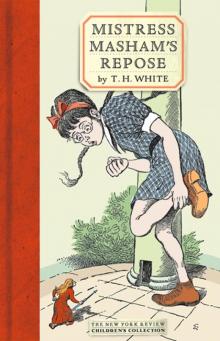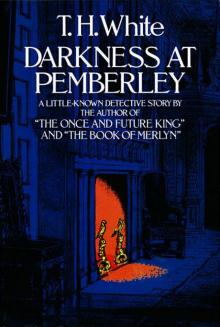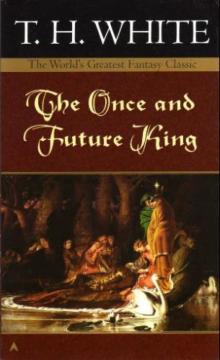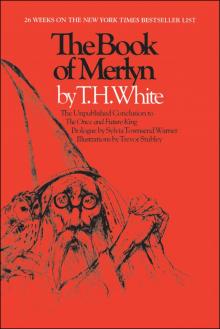- Home
- T. H. White
The Once and Future King (#1-4) Page 15
The Once and Future King (#1-4) Read online
Page 15
The mash squad conversed with each other while they worked. He thought this was a good sign at first, and listened, to pick up what he could.
‘Oh Ark!’ one of them would say. ‘Ear comes that Mammy – mammy – mammy – mammy song again. I dew think that Mammy – mammy – mammy – mammy song is loverly (done). It is so high—class (done).’
Another remark, ‘I dew think our beloved Leader is wonderful, don’t yew? They sigh she was stung three hundred times in the last war, and was awarded the Ant Cross for Valour.’
‘How lucky we are born in the “A” nest, don’t yew think, and wouldn’t it be hawful to be one of those orrid “B”s.’
‘Wasn’t it hawful about 310099/WD! Of course e was hexecuted at once, by special order of ar beloved Leader.’
‘Oh Ark! Ear comes that Mammy – mammy – mammy – mammy song again. I dew think…’
He walked away to the nest with a full gorge, leaving them to do the round again. They had no news, no scandal, nothing to talk about. Novelties did not happen to them. Even the remarks about the executions were in a formula, and only varied as to the registration number of the criminal. When they had finished with the Mammy – mammy – mammy – mammy, they had to go on to the beloved Leader, and then to the filthy Barbarus B and to the latest execution. It went round in a circle. Even the beloveds, wonderfuls, luckies and so on were all Dones, and the awfuls were Not—Dones.
The boy found himself in the hall of the fortress, where hundreds and hundreds of ants were licking or feeding in the nurseries, carrying grubs to various aisles to get an even temperature, and opening or closing the ventilation passages. In the middle, the Leader sat complacently, laying eggs, attending to the broadcasts, issuing directions or commanding executions, surrounded by a sea of adulation. (He learned from Merlyn later that the method of succession among these Leaders was variable according to the different kind of ant. In Bothriomyrmex, for instance, the ambitious founder of a New Order would invade a nest of Tapinoma and jump on the back of the older tyrant. There, concealed by the smell of her host, she would slowly saw off the latter’s head, until she herself had achieved the right of leadership.)
There was no larder for his store of mash, after all. When anybody wanted a meal, they stopped him, got him to open his mouth, and fed from it. They did not treat him as a person, and indeed, they were impersonal themselves. He was a dumb—waiter from which dumb—diners fed. Even his stomach was not his own.
But we need not go on about the ants in too much detail – they are not a pleasant subject. It is enough to say that the boy went on living among them, conforming to their habits, watching them so as to understand as much as he could, but unable to ask questions. It was not only that their language had not got the words in which humans are interested – so that it would have been impossible to ask them whether they believed in Life, Liberty and the Pursuit of Happiness – but also that it was dangerous to ask questions at all. A question was a sign of insanity to them. Their life was not questionable: it was dictated. He crawled from nest to seeds and back again, exclaimed that the Mammy song was loverly, opened his jaws to regurgitate, and tried to understand as well as he could.
Later in the afternoon a scouting ant wandered across the rush bridge which Merlyn had commanded him to make. It was an ant of exactly the same species, but it came from the other nest. It was met by one of the scavenging ants and murdered.
The broadcasts changed after this news had been reported – or rather, they changed as soon as it had been discovered by spies that the other nest had a good store of seeds.
Mammy – mammy – mammy gave place to Antland, Antland Over All, and the stream of orders were discontinued in favour of lectures about war, patriotism or the economic situation. The fruity voice said that their beloved country was being encircled by a horde of filthy Other—nesters – at which the wireless chorus sang:
When other blood spurts from the knife,
Then everything is fine.
It also explained that Ant the Father had ordained in his wisdom that Othernest pismires should always be the slaves of Thisnest ones. Their beloved country had only one feeding tray at present – a disgraceful state of affairs which would have to be remedied if the dear race were not to perish. A third statement was that the national property of Thisnest was being threatened. Their boundaries were to be violated, their domestic animals, the beetles, were to be kidnapped, and their communal stomach would be starved. The Wart listened to two of these broadcasts carefully, so that he would be able to remember them afterwards.
The first one was arranged as follows:
A. We are so numerous that we are starving.
B. Therefore we must encourage still larger families so as to become yet more numerous and starving.
C. When we are so numerous and starving as all that, obviously we shall have a right to take other people’s stores of seed. Besides, we shall by then have a numerous and starving army.
It was only after this logical train of thought had been put into practice, and the output of the nurseries trebled – both nests meanwhile getting ample mash for all their needs from Merlyn – for it has to be admitted that starving nations never seem to be quite so starving that they cannot afford to have far more expensive armaments than anybody else – it was only then that the second type of lecture was begun.
This is how the second kind went:
A. We are more numerous than they are, therefore we have a right to their mash.
B. They are more numerous than we are, therefore they are wickedly trying to steal our mash.
C. We are a mighty race and have a natural right to subjugate their puny one.
D. They are a mighty race and are unnaturally trying to subjugate our inoffensive one.
E. We must attack them in self—defence.
F. They are attacking us by defending themselves.
G. If we do not attack them today, they will attack us tomorrow.
H. In any case we are not attacking them at all. We are offering them incalculable benefits.
After the second kind of address, the religious services began. These dated – the Wart discovered later – from a fabulous past so ancient that one could scarcely find a date for it – a past in which the emmets had not yet settled down to communism. They came from a time when ants were still like men, and very impressive some of the services were.
A psalm at one of them – beginning, if we allow for the difference of language, with the well—known words, ‘The earth is the Sword’s and all that therein is, the compass of the bomber and they that bomb therefrom’ – ended with the terrific conclusion: ‘Blow up your heads, O ye Gates, and be ye blown up, ye Everlasting Doors, that the King of Glory may come in. Who is the King of Glory? Even the Lord of Ghosts, He is the King of Glory.’
A strange feature was that the ordinary ants were not excited by the songs, nor interested by the lectures. They accepted them as matters of course. They were rituals to them, like the Mammy songs or the conversations about their Beloved Leader. They did not look at these things as good or bad, exciting, rational or terrible. They did not look at them at all, but accepted them as Done.
The time for the war came soon enough. The preparations were in order, the soldiers were drilled to the last ounce, the walls of the nest had patriotic slogans written on them, such as ‘Stings or Mash?’ or ‘I Vow to Thee, my Smell,’ and the Wart was past hoping. The repeating voices in his head, which he could not shut off – the lack of privacy, under which others ate from his stomach while the others again sang in his brain – the dreary blank which replaced feeling – the dearth of all but two values – the total monotony more than the wickedness: these had begun to kill the joy of life which belonged to his boyhood.
The horrible armies were on the point of joining battle, to dispute the imaginary boundary between their glass trays, when Merlyn came to his rescue. He magicked the sickened explorer of animals back to bed, and glad enough he was to be there
.
Chapter XIV
In the autumn everybody was preparing for the winter. At night they spent the time rescuing Daddy—long—legs from their candles and rushlights. In the daytime the cows were turned into the high stubble and weeds which had been left by the harvest sickles. The pigs were driven into the purlieus of the forest, where boys beat the trees to supply them with acorns. Everybody was at a different job. From the granary there proceeded an invariable thumping of flails; in the strip fields the slow and enormously heavy wooden ploughs sailed up and down for the rye and the wheat, while the sowers swung rhythmically along, with their hoffers round their necks, casting right hand for left foot and vice versa. Foraging parties came lumbering in with their spike—wheeled carts full of bracken, remarking wisely that they must:
Get whome with ee breakes ere all summer be gone
For tethered up cattle to sit down upon,
while others dragged in timber for the castle fires. The forest rang in the sharp air with the sound of beetle and wedge.
Everybody was happy. The Saxons were slaves to their Norman masters if you chose to look at it in one way – but, if you chose to look at it in another, they were the same farm labourers who get along on too few shillings a week today. Only neither the villein nor the farm labourer starved, when the master was a man like Sir Ector. It has never been an economic proposition for an owner of cattle to starve his cows, so why should an owner of slaves starve them? The truth is that even nowadays the farm labourer accepts so little money because he does not have to throw his soul in with the bargain – as he would have to do in a town – and the same freedom of spirit has obtained in the country since the earliest times. The villeins were labourers. They lived in the same one—roomed hut with their families, few chickens, litter of pigs, or with a cow possibly called Crumbocke – most dreadful and insanitary! But they liked it. They were healthy, free of an air with no factory smoke in it, and, which was most of all to them, their heart’s interest was bound up with their skill in labour. They knew that Sir Ector was proud of them. They were more valuable to him than his cattle even, and, as he valued his cattle more than anything else except his children, this was saying a good deal. He walked and worked among his villagers, thought of their welfare, and could tell the good workman from the bad. He was the eternal farmer, in fact – one of those people who seem to be employing labour at so many shillings a week, but who were actually paying half as much again in voluntary overtime, providing a cottage free, and possibly making an extra present of milk and eggs and home—brewed beer into the bargain.
In other parts of Gramarye, of course, there did exist wicked and despotic masters – feudal gangsters whom it was to be King Arthur’s destiny to chasten – but the evil was in the bad people who abused it, not in the feudal system.
Sir Ector was moving through these activities with a brow of thunder. When an old lady who was sitting in a hedge by one of the strips of wheat, to scare away the rooks and pigeons, suddenly rose up beside him with an unearthly screech, he jumped nearly a foot in the air. He was in a nervous condition.
‘Dang it,’ said Sir Ector. Then, considering the subject more attentively, he added in a loud, indignant voice, ‘Splendour of God!’ He took the letter out of his pocket and read it again.
The Overlord of The Castle of Forest Sauvage was more than a farmer. He was a military captain, who was ready to organize and lead the defence of his estate against the gangsters, and he was a sportsman who sometimes took a day’s joustin’ when he could spare the time. But he was not only these. Sir Ector was an MFH – or rather a Master of stag and other hounds – and he hunted his own pack himself. Clumsy, Trowneer, Phoebe, Colle, Gerland, Talbot, Luath, Luffra, Apollon, Orthros, Bran, Gelert, Bounce, Boy, Lion, Bungey, Toby, Diamond and Cavall were not pet dogs. They were the Forest Sauvage Hounds no subscription, two days a week, huntsman the Master.
This is what the letter said, if we translate it from the Latin:
The King to Sir Ector, etc.
We send you William Twyti, our huntsman, and his fellows to hunt in the Forest Sauvage with our boarhounds (canibus nostris porkericis) in order that they may capture two or three boars. You are to cause the flesh they capture to be salted and kept in good condition, but the skins you are to cause to be bleached which they give you, as the said William shall tell you. And we command you to provide necessaries for them as long as they shall be with you by our command, and the cost, etc., shall be accounted, etc.
Witnessed at the Tower of London, 20 November, in the twelfth year of our reign.
UTHER PENDRAGON
12 Uther.
Now the forest belonged to the King, and he had every right to send his hounds to hunt in it. Also he maintained a number of hungry mouths – what with his court and his army – so that it was natural that he should want as many dead boars, bucks, roes, etc., to be salted down as possible.
He was in the right. This did not take away the fact that Sir Ector regarded the forest as his forest, and resented the intrusion of the royal hounds – as if his own would not do just as well! The King had only to send for a couple of boars and he would have been delighted to supply them himself. He feared that his coverts would be disturbed by a lot of wild royal retainers – never know what these city chaps will be up to next – and that the King’s huntsman, this fellow Twyti, would sneer at his humble hunting establishment, unsettle the hunt servants and perhaps even try to interfere with his own kennel management. In fact, Sir Ector was shy. Then there was another thing. Where the devil were the royal hounds to be kept? Was he, Sir Ector, to turn his own hounds into the street, so as to put the King’s hounds in his kennels? ‘Splendour of God!’ repeated the unhappy master. It was as bad as paying tithes.
Sir Ector put the accursed letter in his pocket and stumped off the ploughing. The villeins, seeing him go, remarked cheerfully, ‘Our wold measter be on the gad again seemingly.’
It was a confounded piece of tyranny, that was what it was. It happened every year, but it was still that. He always solved the kennel problem in the same way, but it still worried him. He would have to invite his neighbours to the meet specially, to look as impressive as possible under the royal huntsman’s eye, and this would mean sendin’ messengers through the forest to Sir Grummore, etc. Then he would have to show sport. The King had written early, so that evidently he intended to send the fellow at the very beginnin’ of the season. The season did not begin till the 25th of December. Probably the chap would insist on one of these damned Boxin’ Day meets – all show—off and no business – with hundreds of foot—people all hollerin’ and headin’ the boar and trampin’ down the seeds and spoilin’ sport generally. How the devil was he to know in November where the best boars would be on Boxin’ Day? What with sounders and gorgeaunts and hogsteers, you never knew where you were. And another thing. A hound that was going to be used next summer for the proper Hart huntin’ was always entered at Christmas to the boar. It was the very beginnin’ of his eddication – which led up through hares and what—nots to its real quarry – and this meant that the fellow Twyti would be bringin’ down a lot of raw puppies which would be nothin’ but a plague to everybody. ‘Dang it!’ said Sir Ector, and stamped upon a piece of mud.
He stood gloomily for a moment, watching his two boys trying to catch the last leaves in the chase. They had not gone out with that intention, and did not really, even in those distant days, believe that every leaf you caught would mean a happy month next year. Only, as the west wind tore the golden rags away, they looked fascinating and difficult to catch. For the mere sport of catching them, of shouting and laughing and feeling giddy as they looked up, and of darting about to trap the creatures, which were certainly alive in the cunning with which they slipped away, the two boys were prancing about like young fauns in the ruin of the year. Wart’s shoulder was well again.
The only chap, reflected Sir Ector, who could be really useful in showin’ the King’s huntsman proper sport was
that fellow Robin Hood. Robin Wood, they seemed to be callin’ him now – some new—fangled idea, no doubt. But Wood or Hood, he was the chap to know where a fine tush was to be found. Been feastin’ on the creatures for months now, he would not be surprised, even if they were out of season.
But you could hardly ask a fellow to hunt up a few beasts of venery for you, and then not invite him to the meet. While, if you did invite him to the meet, what would the King’s huntsman and the neighbours say at havin’ a partisan for a fellow guest? Not that this Robin Wood was not a good fellow: he was a good chap, and a good neighbour too. He had often tipped Sir Ector the wink when a raiding party was on its way from the Marches, and he never molested the knight or his farming in any way. What did it matter if he did chase himself a bit of venison now and then? There was four hundred square miles of forest, so they said, and enough for all. Leave well alone, that was Sir Ector’s motto. But that did not alter the neighbours.
Another thing was the riot. It was all very well for the crack hunts in practically artificial forests like those at Windsor, where the King hunted, but it was a different thing in the Forest Sauvage. Suppose His Majesty’s famous hounds were to go runnin’ riot after a unicorn or something? Everybody knew that you could never catch a unicorn without a young virgin for bait (in which case the unicorn meekly laid its white head and mother—of—pearl horn in her lap) and so the puppies would go chargin’ off into the forest for leagues and leagues, and never catch it, and get lost, and then what would Sir Ector say to his sovereign? It was not only unicorns. There was the Beast Glatisant that everybody had heard so much about. If you had the head of a serpent, the body of a leopard, the haunches of a lion, and were footed like a hart, and especially if you made a noise like thirty couple of hounds questin’, it stood to reason that you would account for an excessive number of royal puppies before they pulled you down. Serve them right too. And what would King Pellinore say if Master William Twyti did succeed in killing his beast? Then there were the small dragons which lived under stones and hissed like kettles – dangerous varmints, very. Or suppose they were to come across one of the really big dragons? Suppose they were to run into a griffin?

 The Once and Future King (#1-4)
The Once and Future King (#1-4) Once & Future King 05 - The Book of Merlyn
Once & Future King 05 - The Book of Merlyn Mistress Masham's Repose
Mistress Masham's Repose Darkness at Pemberley
Darkness at Pemberley The Once and Future King
The Once and Future King The Book of Merlyn
The Book of Merlyn Candle in the Wind
Candle in the Wind